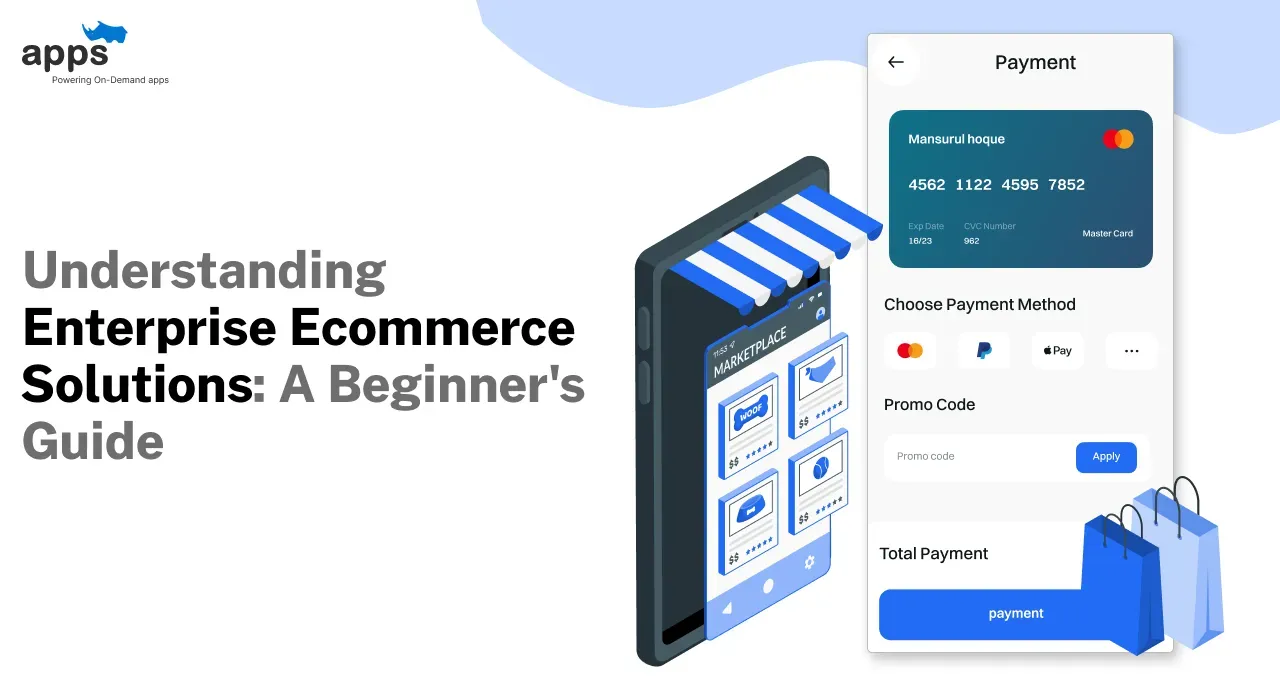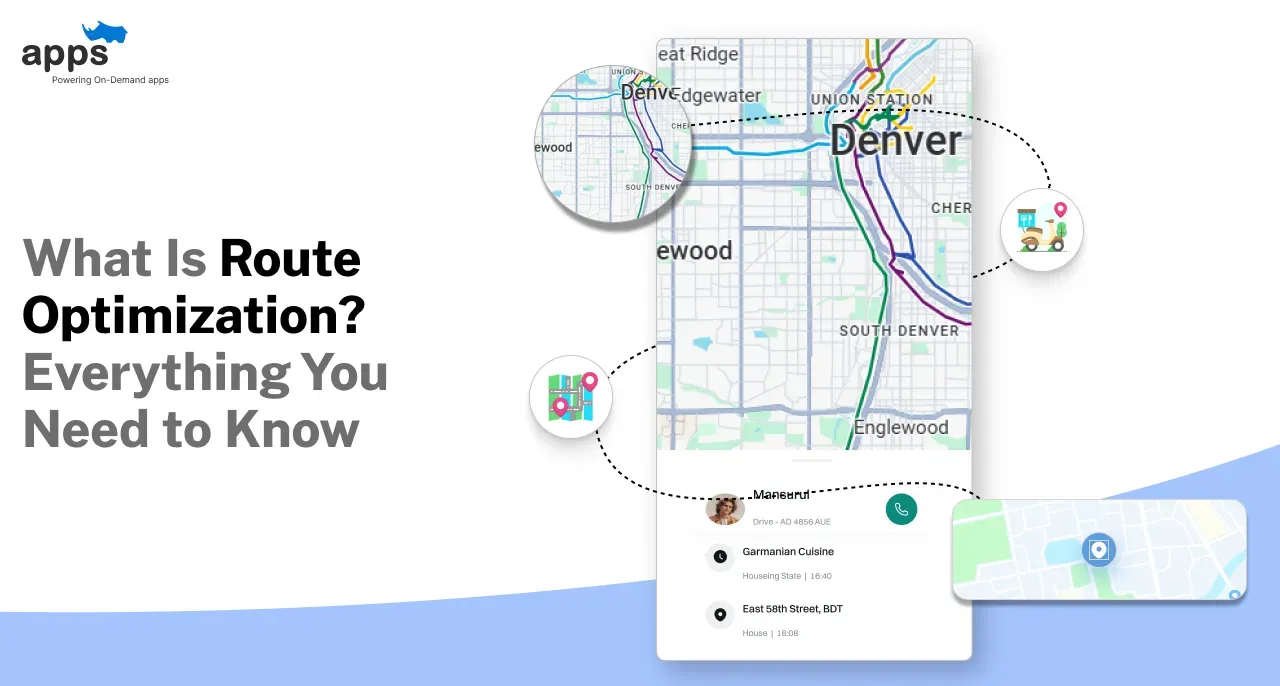- What is Enterprise Ecommerce Solutions?
- Types of Enterprise Ecommerce Solutions
- Features to Consider When Choosing a Custom eCommerce Solution
- Benefits of Enterprise Ecommerce Solutions
- Disadvantages of Enterprise Ecommerce Solutions
- Implementing an Enterprise Ecommerce Solution
- How AppsRhino Can Help?
- Frequently Asked Questions (FAQs)
Table of Contents
Understanding Enterprise Ecommerce Solutions: A Beginner's Guide

Ecommerce is bigger than ever, and businesses need the right tools to keep up. That’s where enterprise eCommerce solutions come in.
These platforms help manage everything from online sales to customer experiences, making it easier to grow and scale. Did you know the global Enterprise Software market is estimated to reach US$315.00bn by 2025? (Statista)
In this guide, we’ll talk about what enterprise eCommerce solutions are, why they matter, their key features, and how they can work for your business.
Whether you’re just starting or looking to upgrade, this article will break down the basics to help you make informed decisions. Let’s get started!
What is Enterprise Ecommerce Solutions?
Enterprise ecommerce solutions are powerful tools for big businesses to run their online stores. They help manage sales, inventory, customer data, and daily operations smoothly.
For example, HubSpot offers an e-commerce platform that helps businesses grow by handling everything from tracking customer journeys to managing online orders.
These solutions are built to handle large numbers of sales, provide strong security, and work well with other tools. They make it easier for businesses to manage their online stores, serve customers better, and grow faster.
Types of Enterprise Ecommerce Solutions
Choosing the right enterprise ecommerce solution depends on your business needs, technical capabilities, and budget.
You must consider factors like the size and complexity of your product catalog, desired level of customization, and integration requirements with existing business systems.

1. SaaS (Software as a Service) Ecommerce Platforms
These cloud-based solutions are readily available and require minimal technical expertise. They offer a user-friendly interface for managing your online store and often come with built-in features like product management, marketing tools, and payment processing.
Pros: Easy to implement and manage, cost-effective (subscription-based pricing), regular updates and maintenance handled by the provider.
Cons: Limited customization options may not offer the level of scalability required for very large businesses and can be restrictive for integrating with specific existing business systems.
2. Headless Commerce Platforms
These platforms separate your online store's front-end (user interface) from the back-end (ecommerce functionality). This allows maximum flexibility in designing your customers' unique and customized shopping experience.
Pros: Highly customizable storefront, allows for seamless integration with existing business systems, ideal for businesses with complex product catalogs or unique customer journeys.
Cons: Requires more technical expertise for implementation and ongoing maintenance, can be more expensive than SaaS solutions due to development costs.
3. Marketplace Solutions
These platforms facilitate a multi-vendor marketplace environment, allowing multiple businesses to sell their products through a single online store. This can be a great option for companies looking to expand their product offerings or create a B2B ecosystem for specific industries.
Pros: Increased product selection attracts a broader customer base, reduces the burden of managing individual product catalogs, and simplifies buyer order fulfillment.
Cons: Less control over branding and customer experience compared to a standalone store, potential for competition from other vendors within the marketplace, commission fees associated with each sale.
4. Open-Source Ecommerce Platforms
These custom eCommerce solutions freely offer the source code, allowing for complete customization and control over your online store. While providing significant flexibility, open-source solutions require high technical expertise for installation, configuration, and ongoing maintenance.
Pros: Highly customizable, no licensing fees, ideal for businesses with unique technical requirements.
Cons: Requires significant technical expertise and resources to manage, security updates and maintenance become your responsibility.
Features to Consider When Choosing a Custom eCommerce Solution
Selecting the right eCommerce development solution is crucial for building a successful online business.
Beyond choosing a platform, it’s essential to prioritize specific features to ensure smooth operations and an enhanced customer experience. Here are the key functionalities to consider.
Robust Product Information Management (PIM)
Managing product details effectively is essential for an organized and user-friendly online store. A robust PIM system ensures accurate product data across channels, including specifications, images, and descriptions.
By using custom ecommerce solutions, businesses can centralize and update product information effortlessly, enabling customers to make informed buying decisions while reducing the need for manual intervention.
CRM Integration
Integrating your customized ecommerce solution with a CRM system lets you personalize the customer experience.
Features like order history tracking, account management, and personalized product recommendations help strengthen customer relationships.
Using customer data can drive repeat purchases and improve loyalty, setting your online store apart from competitors.
Generative AI integration
Integrating AI and Generative AI into customized ecommerce solutions enhances efficiency and personalization.
AI chatbots provide 24/7 customer support, while Generative AI creates dynamic product descriptions, personalized emails, and tailored recommendations.
AI-powered analytics optimize pricing, forecast demand, and identify trends, enabling more intelligent decisions. Businesses using AI in ecommerce development solutions report a 10-12% revenue increase, with profitability projected to grow by 59% by 2035. (SellersCommerce)

Scalability and Performance
As your business grows, your eCommerce platform should effortlessly handle increased traffic, more extensive product catalogs, and higher transaction volumes.
Choose a solution designed for scalability and reliability.
A well-optimized ecommerce development solution minimizes downtime and ensures a smooth shopping experience, even during peak sales.
Advanced Security Features
Security is a cornerstone of any successful online business. Look for a platform with advanced security measures such as encrypted payment gateways, user access controls, and compliance with industry regulations like PCI DSS.
Customized ecommerce solutions often include tailored security features that protect sensitive customer and business data from potential threats.
Marketing and Analytics Tools
To drive growth, your enterprise ecommerce solution should offer built-in tools for marketing and analytics. Features like email automation, discount management, and targeted campaigns can help attract and retain customers.
Analytics tools provide insights into sales trends and customer behavior, enabling you to optimize your marketing strategies and maximize revenue.
Order Management and Fulfillment
Streamlining order processing and fulfillment is critical to maintaining customer satisfaction.
A robust eCommerce solution should include automated shipping notifications, real-time inventory tracking, and integration with leading fulfillment services.
These tools ensure timely deliveries and reduce operational inefficiencies.
Mobile Optimization
Mobile optimization is non-negotiable, with mobile devices accounting for a significant share of online purchases. Ensure your platform includes a responsive design and a seamless mobile shopping experience.
Custom ecommerce solutions can be tailored for mobile users, providing intuitive navigation, faster loading times, and a smooth checkout process.
By prioritizing these features, businesses can select enterprise ecommerce solutions that align with their goals and deliver an exceptional customer experience. A combination of scalability, security, and custom features ensures long-term growth and success in the competitive eCommerce market.
Suggested Reading:
How to Choose Right Enterprise ecommerce Platform in 7 Steps
Benefits of Enterprise Ecommerce Solutions
Implementing enterprise eCommerce solutions can flip the game in your favor.
Most of these tools are feature-packed, replacing several standalone systems and forming an integrated hub for different departments to work smoothly. Here are some more benefits:
1. Enhanced Scalability: Enterprise eCommerce platforms are designed to handle high traffic and transaction volumes, allowing your business to grow without performance issues. For example, in December 2023, Amazon.com recorded approximately 2.27 billion web visits, demonstrating its capacity to manage substantial traffic surges.
2. Streamlined Automation: Automating processes like order processing and inventory management reduces manual errors and operational costs. In fact, companies adopting automation have seen a 20% reduction in customer service costs. (Gepard)
3. Robust Security: With the rise of data breaches, enterprise eCommerce solutions prioritize security, implementing secure payment gateways and data encryption to protect sensitive information. The highest privacy spending was recorded among large organizations (with 10,000 or more employees) in 2023, around 3.9 million U.S. dollars on average. (Statista)
4. Improved User Experience: A seamless and responsive user interface enhances customer satisfaction and loyalty. Businesses focusing on user experience have significantly improved customer engagement and sales.
5. Advanced Analytics: Access to comprehensive data analytics allows for informed decision-making and personalized marketing strategies. Utilizing analytics can lead to a better understanding of customer behavior and increased sales.

6. Customization and Personalization: Enterprise eCommerce solutions provide tools for customized eCommerce solutions, allowing businesses to create personalized customer experiences. According to McKinsey, 71% of customers expect personalization, & companies offering it can see a 40% increase in revenue growth.
7. Multi-Channel Support: These platforms enable seamless integration across multiple sales channels like websites, mobile apps, social media, and marketplaces. Companies with strong multi-channel strategies experience 91% greater year-over-year customer retention rates.
8. Global Reach and Localization: Enterprise solutions support global expansion by offering features like multi-currency payments, localized languages, and compliance with international regulations. Businesses using localization tools report an average of 30% higher engagement rates in global markets.
9. Inventory and Supply Chain Management: Real-time inventory tracking and supply chain management tools optimize stock levels, reducing stockouts and overstock situations. Moreover, companies with automated inventory management systems report 30% cost savings in supply chain operations.
By utilizing these benefits, businesses can optimize operations, enhance customer satisfaction, and achieve long-term growth in their ecommerce business.
Disadvantages of Enterprise Ecommerce Solutions
While enterprise ecommerce solutions offer undeniable advantages, there are also some drawbacks to consider before taking the plunge. Here's a breakdown of the potential downsides:
1. High upfront Investment
Enterprise eCommerce platforms often require significant initial investments, including costly software licenses, implementation fees, and ongoing maintenance expenses. In fact, implementation costs can range from one to five times the annual cost of the solution.
Costly Software Licenses: Enterprise platforms often have hefty licensing fees based on features, customization needs, and transaction volume. Be prepared for a significant initial investment.
Implementation Costs: Setting up and configuring a complex platform can be resource-intensive, requiring specialized expertise and potentially consulting fees.
Ongoing Maintenance: Maintaining and updating the platform requires ongoing technical support, which adds to your operational costs.
2. Complexity and Learning Curve
Managing enterprise e-commerce platforms can be challenging due to their advanced capabilities. While these tools offer powerful features, getting the most out of them often requires careful planning and technical expertise.
On average, companies provide about 62.4 hours of training per employee yearly, which may not be sufficient for mastering complex software systems. (SupplyGem)
Steep Learning Curve: Enterprise solutions are feature-rich and complex, requiring your team to invest time and resources in learning the platform and its functionalities.
Customization Challenges: Extensive customization options can be a double-edged sword. While they allow for a tailored experience, complex customizations can be time-consuming to implement and maintain.
Integration Woes: Integrating the platform with your existing systems (ERP, CRM) might require technical expertise and could be a potential source of headaches.
3. Resource Demands
Managing complex platforms often necessitates an in-house IT team or ongoing vendor support, increasing operational costs. Maintaining an extensive product catalog and creating engaging content demand dedicated resources to ensure a high-quality customer experience.
Technical Expertise: Managing a complex platform often requires an in-house IT team or ongoing support from the vendor, which can add to your ongoing resource needs.
Content Management: Maintaining a large product catalog and creating engaging content requires a dedicated team to ensure a high-quality customer experience.
Marketing Efforts: The platform itself won't guarantee success. You'll still need to invest in marketing and customer acquisition strategies to drive traffic to your online store.
Suggested Reading:
ERP Integration: Streamlining Operations for Enterprise eCommerce
4. Less Agility Compared to Smaller Platforms
Due to their complexity, enterprise solutions may lack the agility of smaller platforms, making quick changes or updates more challenging. Scaling operations might require additional investments in infrastructure or customization to maintain performance.
Customization Limitations: While offering flexibility, the complex nature of these platforms can make them less agile for quick changes or updates compared to smaller, more user-friendly options.
Scalability Considerations: Scaling can be a two-way street. While they handle large volumes, significant growth might require additional investments in infrastructure or customization to maintain performance.
5. Not a Magic Bullet for Success
Implementing an enterprise eCommerce solution doesn't automatically ensure business success. A solid business strategy, effective marketing, and customer service focus are crucial to thriving online. Implementation timelines can be longer due to the complexity of these solutions, potentially delaying your launch date.
Focus on Business Strategy: The platform is a tool, not a guarantee of success. You still need a solid business strategy, effective marketing, and a focus on customer service to thrive online.
Potential Implementation Delays: Implementation timelines can be longer due to the complexity of these solutions, potentially delaying your launch date and time to market advantage.
Understanding these potential disadvantages is vital for businesses considering enterprise eCommerce solutions, enabling them to make informed decisions and plan accordingly.
Implementing an Enterprise Ecommerce Solution
The benefits and features paint a cozy picture, but you shouldn’t jump on the gun and start implementing Enterprise eCommerce solutions. There is a framework to go about this.
So, let’s understand the implementation process:
1. Planning and Discovery
The first step is thorough planning and identifying your specific needs. This includes:
Business Goals: Define clear objectives for your online store, such as increasing sales, reaching more customers, or streamlining operations.
Platform Selection: Shortlist and evaluate potential enterprise ecommerce solutions that align with your needs, budget, and desired features.
Resource Allocation: Determine whether you’ll use internal IT expertise or need external partners for implementation.
2. System Integration
Integrating your platform with existing business systems is critical. Ensure smooth connectivity with tools like CRM for customer data, ERP for inventory management, and accounting software for seamless transactions.
Look for custom ecommerce solutions that offer flexible integration options tailored to your needs.

3. Data Migration
Data migration is key if you’re transitioning from an existing system to an enterprise ecommerce solution.
This involves securely transferring product details, customer information, and order history to the new platform. Prioritize accuracy to ensure a seamless shift to your ecommerce development solution.
4. Store Design and Development
This stage involves designing and developing your online presence, whether a web store, mobile app, or multi-platform solution.
Focus on creating a user-friendly interface that aligns with your brand identity. Depending on the platform, you may need to customize functionalities or integrate unique features.
Using customized ecommerce solutions, you can ensure a seamless experience across web, Android, and iOS apps, meeting your customers wherever they are.
5. Testing and Launch
Thorough testing is essential before going live. Test everything—product listings, shopping carts, payment gateways, and order processing. Once all functionalities run smoothly, your online store is ready for launch!
Implementing enterprise ecommerce solutions requires careful planning and execution, but the results are worth it. Focusing on the right tools and strategies will create a robust platform to support your business growth and customer satisfaction.
How AppsRhino Can Help?
Choosing the right partner for your enterprise eCommerce solution is crucial for ensuring success. AppsRhino specializes in building scalable, robust, and feature-rich custom ecommerce solutions tailored to your business needs.
Whether you’re looking to create an online store, a mobile app, or a multi-platform solution, our team of experts can deliver a seamless experience that integrates all the tools and features your business requires.
Our ecommerce development solutions are designed to handle high transaction volumes, deliver exceptional user experiences, and prioritize data security.
With a proven track record of delivering 200+ customized ecommerce solutions, we help businesses transform their digital operations and achieve long-term success.
Let AppsRhino guide your eCommerce journey, ensuring a platform that grows with your business and meets your customers' evolving expectations.
Frequently Asked Questions (FAQs)
What are Enterprise Ecommerce Solutions?
Enterprise ecommerce solutions are robust platforms designed to handle the complex needs of large businesses with high sales volume, extensive product catalogs, and intricate order fulfillment processes.
How are Enterprise Ecommerce Solutions Different from Regular Ecommerce Platforms?
Unlike basic platforms, enterprise solutions offer features like advanced scalability, robust security, customization options, and integrations with existing business systems (ERP, CRM) for a seamless workflow.
Who Needs Enterprise Ecommerce Solutions?
Businesses with a large product catalog, high order volume, complex B2B transactions, or a desire for a highly customized shopping experience benefit most from enterprise solutions.
Table of Contents
- What is Enterprise Ecommerce Solutions?
- Types of Enterprise Ecommerce Solutions
- Features to Consider When Choosing a Custom eCommerce Solution
- Benefits of Enterprise Ecommerce Solutions
- Disadvantages of Enterprise Ecommerce Solutions
- Implementing an Enterprise Ecommerce Solution
- How AppsRhino Can Help?
- Frequently Asked Questions (FAQs)




